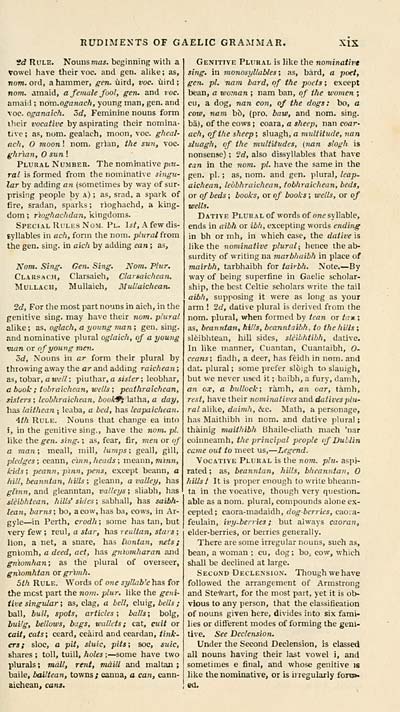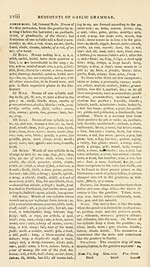Download files
Complete book:
Individual page:
Thumbnail gallery: Grid view | List view

RUDIMENTS OF GAELIC GRAMMAR.
XIX
id Rule. Nouns maj. beginning with a
vowel have their voe. and gen. alike ; as,
nom.ord, a hammer, gen. ùird, voc. ùirdj
no/re. amaid, a female foo!, gen. and voc.
amaid ; nom.oganac/i , young man, gen. and
voe. oganaich. od. Feminine nouns form
ihcir vocative by aspirating their nomina-
tive; as, nora. gealaeh, moon, voc. gheal-
ach, moon ! nom. grian, the sun, voc.
ghrian, sun !
Plural Number. The nominative pin.
ral is formed from the nominative singtt-
lar by adding an (sometimes by way of sur-
prisiiig people by a) ; as, srad, a spark of
fire, sradan, sparks ; rioghachd, a king-
dom ; r'loghachdan, kingdoms.
Special Rules No.M. Pl. Is/, A few dis-
syllables in ach, form the nom. plnral hora
the gen. sing, in aich by adding ean ; as,
Kom. Sing. Gen. Sing. Nom. Plur.
Clarsac.h, Clarsaich, Clarsaichean.
TiIULLACH, MuUaich, 31 ul/aichean.
2d, For the most part nouns in aich, in the
genitive sing, may have their nom. phtral
alike; as, oglach,a young man; gen. sing,
and nominative plural oglaich, of a young
man or of young men.
5d, Nouns in ar form their plural by
throwing away the ar and adding raichean ;
as, lobar, a well ; piuthar, a sister ; leobhar,
a buok- ; tobraichean, wells ; peathraichean,
sisters ; leobhraichean, book9i latha, a day,
has laithean j leaba, a bed, has leapaicliean.
it/i Rule. Nouns that change ea into
i, in the genitive sing., have the nom. pl.
like the gen. sing. ; as, fear, fir, men or of
a man; meall, mill, lumps; geall, gill,
pledges; ceann, cinn, heads; meann, min>i,
irids; peann, pinn, pens, except beann, a
hill, beanntan, hills; gleann, a valley, has
gl'inn, and gleanntan, valleys ; sliabh, has
slèib/itean, hills' sitles ; sabhall, has saibh-
lean, barns; bo, acow,has ba, cows, in Ar-
gyle — in Perth, crodh; some has tan, but
very few; reul, a star, has reultan, stars;
lion, a net, a snare, has liontan, nets;
gniomh, a deed, act, has gniomharan and
gniomlian; as the plural of overseer,
gniomhtan or grimh.
5th Rule. Words of one syllable has for
the most part the nom. plur. like the geni-
tive singular ; as, clag, a bell, eluig, bells ;
ball, buil, spots, articles; balls; bolg,
bui/g, bellows, bags, wallets; cat, cuit or
cait, cats ; ceard, ceàird and ceardan, tink-
ers s sloe, a pit, sluic, pits; soc, suic,
shares ; toll, tuill, holes ; — some have two
plurals; mall, rent, màiU and maltan ;
baile, bailtean, towns; canna, a can, cann-
aichean, cans.
Genitive Plural is like the nominativt
sing, in monosyllables; as, bard, a poet,
gen. pl. nam bard, of the poets ; except
bean, a woman ; nam ban, of the women ;
cu, a dog, ?ian con, of the dogs: bo, a
cow, nam bb, (pro. baw, and nom. sing,
ba), of the cows; coara, a sheep, nan coar-
ach, of the sheep; sluagh, a multitude, nan
sluagh, of the multitudes, (nan slogh is
nonsense) ; 2rf, also dissyllables that have
ean in the nom. pl. have the same in the
gen. pl. ; as, nom. and gen. plural, leap,
aichean, leobhraichean, tobhraichean, beds,
or of beds ; books, or of books ; wells, or of
wells.
Dative Plural of words of 07ie syllable,
ends in aibh or ibh, excepting words ending
in bh or mh, in which case, the dative is
like the nominative plural ^ hence the ab-
surdity of writing na marbhaibh in place of
mairbh, tarbhaibh for tairbh. Note.— By
way of being superfine in Gaelic scholar-
ship, the best Celtic scholars write the tail
aibh, supposing it were as long as your
arm ! 2c?, dative plural is derived from the
nom. plural, when formed by lean or tax;
as, beanntan, hills, beanntatbh, to the hills;
slèibhtean, hill sides, slèihhtibh, dative.
In like manner, Cuantan, Cuantaibh, 0-
ceans; fiadh, a deer, has fèidh in nom. and
dat. plural ; some prefer slòigh to slauigh,
but we never used it ; baibh, a fury, damh,
an ox, a bullock; ramh, ayi oar, tamh,
rest, have their 7wminatives and datives plu-
ral alike, daimh, &c. Math, a personage,
has Maithibh in nom. and dative plural ;
thainig maithibh Bhaile-cliath niach 'nar
coinneamh, the principal people if DuLlin
came out to meet us, — Legend.
Vocative Plural is the no7n. plu. aspi-
rated; as, beanntan, hills, bheannian,
hiUsl It is proper enough to write bheann-
ta in the vocative, though very question-
able as a nom. plural, compounds alone ex-
cepted ; caora-madaidh, dog-berries, cao; a-
feulain, ivy-berries; but always caoran,
elder-berries, or berries generally.
There are some irregular nouns, such as,
bean, a woman ; cu, dog; bOj cow, which
shall be declined at large.
Second Declensio.v. Though wehave
followed the arrangement of Armstrong
and Ste\Vart, for the most part, yet it is ob-
vious to any person, that the classification
of nouns given here, divides into six fami-
lies or different modes of forming the geni-
tive. See Declension.
Under the Second Declension, is classed
all nouns having their last vowel i, and
sometimes e final, and whose genitive is
like the nominative, or is irregularly forofc
ed.
XIX
id Rule. Nouns maj. beginning with a
vowel have their voe. and gen. alike ; as,
nom.ord, a hammer, gen. ùird, voc. ùirdj
no/re. amaid, a female foo!, gen. and voc.
amaid ; nom.oganac/i , young man, gen. and
voe. oganaich. od. Feminine nouns form
ihcir vocative by aspirating their nomina-
tive; as, nora. gealaeh, moon, voc. gheal-
ach, moon ! nom. grian, the sun, voc.
ghrian, sun !
Plural Number. The nominative pin.
ral is formed from the nominative singtt-
lar by adding an (sometimes by way of sur-
prisiiig people by a) ; as, srad, a spark of
fire, sradan, sparks ; rioghachd, a king-
dom ; r'loghachdan, kingdoms.
Special Rules No.M. Pl. Is/, A few dis-
syllables in ach, form the nom. plnral hora
the gen. sing, in aich by adding ean ; as,
Kom. Sing. Gen. Sing. Nom. Plur.
Clarsac.h, Clarsaich, Clarsaichean.
TiIULLACH, MuUaich, 31 ul/aichean.
2d, For the most part nouns in aich, in the
genitive sing, may have their nom. phtral
alike; as, oglach,a young man; gen. sing,
and nominative plural oglaich, of a young
man or of young men.
5d, Nouns in ar form their plural by
throwing away the ar and adding raichean ;
as, lobar, a well ; piuthar, a sister ; leobhar,
a buok- ; tobraichean, wells ; peathraichean,
sisters ; leobhraichean, book9i latha, a day,
has laithean j leaba, a bed, has leapaicliean.
it/i Rule. Nouns that change ea into
i, in the genitive sing., have the nom. pl.
like the gen. sing. ; as, fear, fir, men or of
a man; meall, mill, lumps; geall, gill,
pledges; ceann, cinn, heads; meann, min>i,
irids; peann, pinn, pens, except beann, a
hill, beanntan, hills; gleann, a valley, has
gl'inn, and gleanntan, valleys ; sliabh, has
slèib/itean, hills' sitles ; sabhall, has saibh-
lean, barns; bo, acow,has ba, cows, in Ar-
gyle — in Perth, crodh; some has tan, but
very few; reul, a star, has reultan, stars;
lion, a net, a snare, has liontan, nets;
gniomh, a deed, act, has gniomharan and
gniomlian; as the plural of overseer,
gniomhtan or grimh.
5th Rule. Words of one syllable has for
the most part the nom. plur. like the geni-
tive singular ; as, clag, a bell, eluig, bells ;
ball, buil, spots, articles; balls; bolg,
bui/g, bellows, bags, wallets; cat, cuit or
cait, cats ; ceard, ceàird and ceardan, tink-
ers s sloe, a pit, sluic, pits; soc, suic,
shares ; toll, tuill, holes ; — some have two
plurals; mall, rent, màiU and maltan ;
baile, bailtean, towns; canna, a can, cann-
aichean, cans.
Genitive Plural is like the nominativt
sing, in monosyllables; as, bard, a poet,
gen. pl. nam bard, of the poets ; except
bean, a woman ; nam ban, of the women ;
cu, a dog, ?ian con, of the dogs: bo, a
cow, nam bb, (pro. baw, and nom. sing,
ba), of the cows; coara, a sheep, nan coar-
ach, of the sheep; sluagh, a multitude, nan
sluagh, of the multitudes, (nan slogh is
nonsense) ; 2rf, also dissyllables that have
ean in the nom. pl. have the same in the
gen. pl. ; as, nom. and gen. plural, leap,
aichean, leobhraichean, tobhraichean, beds,
or of beds ; books, or of books ; wells, or of
wells.
Dative Plural of words of 07ie syllable,
ends in aibh or ibh, excepting words ending
in bh or mh, in which case, the dative is
like the nominative plural ^ hence the ab-
surdity of writing na marbhaibh in place of
mairbh, tarbhaibh for tairbh. Note.— By
way of being superfine in Gaelic scholar-
ship, the best Celtic scholars write the tail
aibh, supposing it were as long as your
arm ! 2c?, dative plural is derived from the
nom. plural, when formed by lean or tax;
as, beanntan, hills, beanntatbh, to the hills;
slèibhtean, hill sides, slèihhtibh, dative.
In like manner, Cuantan, Cuantaibh, 0-
ceans; fiadh, a deer, has fèidh in nom. and
dat. plural ; some prefer slòigh to slauigh,
but we never used it ; baibh, a fury, damh,
an ox, a bullock; ramh, ayi oar, tamh,
rest, have their 7wminatives and datives plu-
ral alike, daimh, &c. Math, a personage,
has Maithibh in nom. and dative plural ;
thainig maithibh Bhaile-cliath niach 'nar
coinneamh, the principal people if DuLlin
came out to meet us, — Legend.
Vocative Plural is the no7n. plu. aspi-
rated; as, beanntan, hills, bheannian,
hiUsl It is proper enough to write bheann-
ta in the vocative, though very question-
able as a nom. plural, compounds alone ex-
cepted ; caora-madaidh, dog-berries, cao; a-
feulain, ivy-berries; but always caoran,
elder-berries, or berries generally.
There are some irregular nouns, such as,
bean, a woman ; cu, dog; bOj cow, which
shall be declined at large.
Second Declensio.v. Though wehave
followed the arrangement of Armstrong
and Ste\Vart, for the most part, yet it is ob-
vious to any person, that the classification
of nouns given here, divides into six fami-
lies or different modes of forming the geni-
tive. See Declension.
Under the Second Declension, is classed
all nouns having their last vowel i, and
sometimes e final, and whose genitive is
like the nominative, or is irregularly forofc
ed.
Set display mode to: Large image | Transcription
Images and transcriptions on this page, including medium image downloads, may be used under the Creative Commons Attribution 4.0 International Licence unless otherwise stated. ![]()
| Early Gaelic Book Collections > Blair Collection > Pronouncing Gaelic dictionary > (23) |
|---|
| Permanent URL | https://digital.nls.uk/76222300 |
|---|
| Description | A selection of books from a collection of more than 500 titles, mostly on religious and literary topics. Also includes some material dealing with other Celtic languages and societies. Collection created towards the end of the 19th century by Lady Evelyn Stewart Murray. |
|---|
| Description | Selected items from five 'Special and Named Printed Collections'. Includes books in Gaelic and other Celtic languages, works about the Gaels, their languages, literature, culture and history. |
|---|

